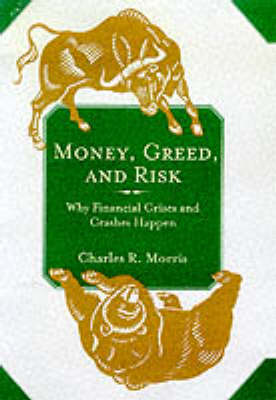Century Foundation Book
1 total work
The world seems awash in financial crises. The Asian crisis of 1998, the near-demise of Long Term Capital Management, and the black hole of Russia are just a few of the most recent. Are they the result of greedy speculators, crony capitalism, or the warp speed of the forces of globalization? Can we send in the repairmen and get things fixed through the legal and regulatory system? Or are there other causes at work that may be beyond our control? Money, Greed, & Risk is that rare book which, through adroit analysis of both historical and contemporary events and their leading players, lends new insights into the causes of financial turmoil.
Charles Morris: Explores the eternal cycle of financial crises: from brilliant innovation to gross excess and inevitable crash, before investors and institutions catch up Explains the shift of financial power from Britain to across the Atlantic, culminating in the American financial system growing from a capital-starved backwater in the nineteenth century to one that plays a leading role in the world today Examines the technological, economic, demographic, and industrial experiences that caused the financial engine to kick into such a high gear in the 1980s and 1990s Shows how the boom-and-bust cycle in early American history helps illuminate recent global events such as in South Asia and Russia. In the process we become more realistic about what to expect during the nascent stages of capitalism and market development everywhere Explains that globalization is nothing new. The investment system in the nineteenth century was perhaps even more global that the world today Looks at contemporary financial geniuses - Michael Milken is a good example - and shows that they didn't invent any financial instruments that nineteenth-century counterparts like Jay Gould hadn't already thought of
Charles Morris: Explores the eternal cycle of financial crises: from brilliant innovation to gross excess and inevitable crash, before investors and institutions catch up Explains the shift of financial power from Britain to across the Atlantic, culminating in the American financial system growing from a capital-starved backwater in the nineteenth century to one that plays a leading role in the world today Examines the technological, economic, demographic, and industrial experiences that caused the financial engine to kick into such a high gear in the 1980s and 1990s Shows how the boom-and-bust cycle in early American history helps illuminate recent global events such as in South Asia and Russia. In the process we become more realistic about what to expect during the nascent stages of capitalism and market development everywhere Explains that globalization is nothing new. The investment system in the nineteenth century was perhaps even more global that the world today Looks at contemporary financial geniuses - Michael Milken is a good example - and shows that they didn't invent any financial instruments that nineteenth-century counterparts like Jay Gould hadn't already thought of
